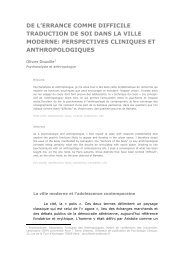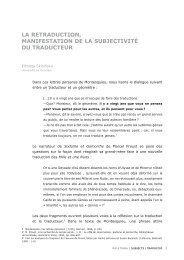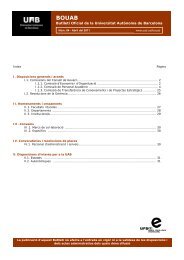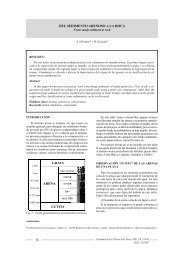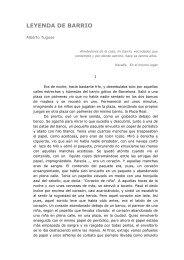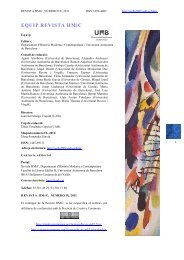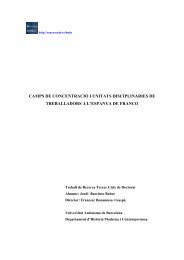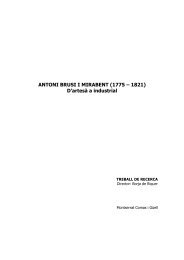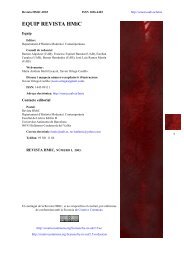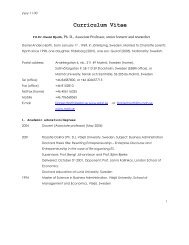EQUIP REVISTA HMiC - Universitat Autònoma de Barcelona
EQUIP REVISTA HMiC - Universitat Autònoma de Barcelona
EQUIP REVISTA HMiC - Universitat Autònoma de Barcelona
Create successful ePaper yourself
Turn your PDF publications into a flip-book with our unique Google optimized e-Paper software.
The mo<strong>de</strong>rnisation of China and the Chinese critique of mo<strong>de</strong>rnity<br />
<strong>de</strong>fen<strong>de</strong>rs of the “universality” of Enlightenment values. This incompatibility could provoke an<br />
intolerance of the diversity of values that would become an ethnocentrism inimical to the<br />
ethnodiversity <strong>de</strong>fen<strong>de</strong>d by the postcolonialist paradigm, aggravating the risks of “a shock of<br />
civilisations”. In addition to being incompatible, the postcolonialist <strong>de</strong>construction of<br />
supposedly universal and justifiable Enlightenment values converts them into the very cause of<br />
many of the ills the rest of the world has suffered at the hands of the inheritors of the<br />
Enlightenment.<br />
A third paradigm that can be used to situate this <strong>de</strong>bate is the concept of mo<strong>de</strong>rnity as a<br />
process of consolidation of capitalist market economy and liberal parliamentary <strong>de</strong>mocracy as<br />
mo<strong>de</strong>ls for economic, social and political mo<strong>de</strong>rnisation. In this sense, both Les Droits <strong>de</strong><br />
l’Homme and laissez-faire are products of the Enlightenment. As Karl Polanyi said, “The origin<br />
of the [World War] catastrophe lay in the utopian en<strong>de</strong>avour of economic liberalism to set up a<br />
self-regulating market” (Polanyi 1944).<br />
John Gray has elaborated on this i<strong>de</strong>a:<br />
The achievement of a similar transformation [to the rupture in England’s economic life<br />
produced by the free markets that operated in<strong>de</strong>pen<strong>de</strong>ntly of social needs] is the<br />
overriding objective today of transnational organizations such as the World Tra<strong>de</strong><br />
Organisation, the International Monetary Fund and the Organisation for Economic<br />
Cooperation and Development. In advancing this revolutionary project they are<br />
following the lead of the world’s last great Enlightenment regime, the United States. The<br />
thinkers of the Enlightenment, such as Thomas Jefferson, Thomas Paine, John Stuart<br />
Mill and Karl Marx never doubted that the future for every nation in the world was to<br />
accept some version of western institutions and values. A diversity of cultures was not a<br />
permanent condition of human life. It was a stage on the way to a universal civilization.<br />
All such thinkers advocated the creation of a single worldwi<strong>de</strong> civilization, in which the<br />
varied traditions and cultures of the past were superse<strong>de</strong>d by a new, universal community<br />
foun<strong>de</strong>d on reason….<br />
A single global market is the Enlightenment’s project of a universal civilization in what<br />
is likely to be its final form. It is not the only variant of that project to have been<br />
attempted in a century that is littered with false Utopias. The former Soviet Union<br />
embodied a rival Enlightenment Utopia, that of a universal civilization in which markets<br />
were replaced by central planning….<br />
Even though a global market cannot be reconciled with any kind of planned economy,<br />
what these Utopias have in common is more fundamental than their differences. In their<br />
cult of reason and efficiency, their ignorance of history and their contempt for the ways<br />
of life they consign to poverty or extinction, they embody the same rationalist hubris and<br />
cultural imperialism that have marked the central traditions of Enlightenment thinking<br />
throughout its history. (Gray 1998, 1-3)<br />
If the term mo<strong>de</strong>rnity serves to <strong>de</strong>scribe this historical process that appeared to have been<br />
consolidated, and therefore terminated, when Francis Fukuyama wrote, “What we are<br />
witnessing is not just the end of the Cold War, or a passing of a particular period of postwar<br />
history, but the end of history as such: that is, the end point of mankind's i<strong>de</strong>ological evolution<br />
and the universalization of Western liberal <strong>de</strong>mocracy as the final form of human government”<br />
(Fukuyama 1989), what processes would or should follow? If nothing were to change, the<br />
following period would be a simple continuation of mo<strong>de</strong>rnity, but if the coming times were to<br />
http://seneca.uab.es/hmic Revista <strong>HMiC</strong>, número IV, 2006<br />
10



